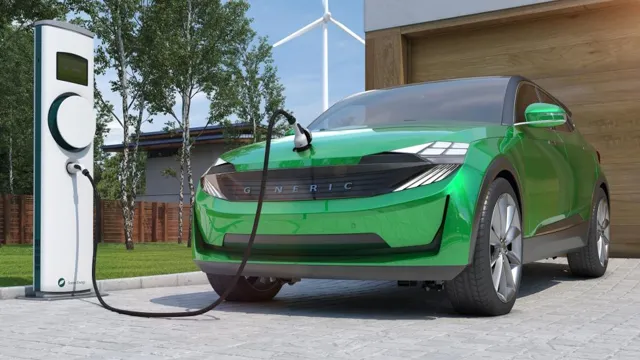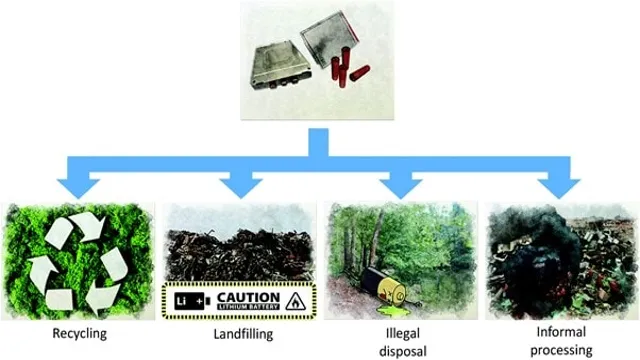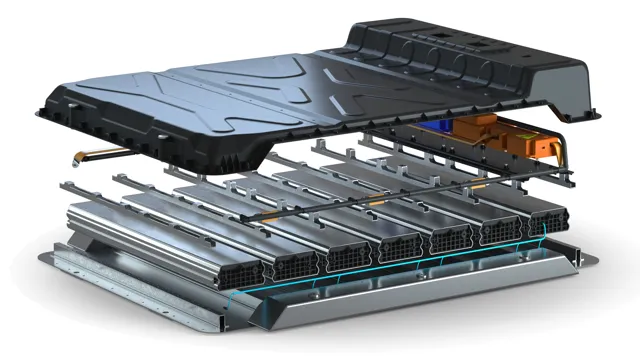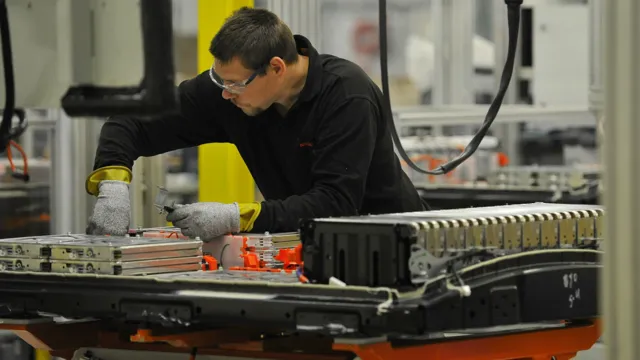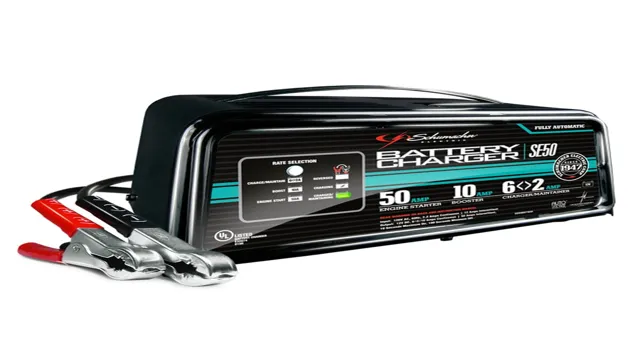Clearing the air: Debunking myths about electric car batteries – Exploring the prominence of lithium-ion batteries
Are you considering an electric car but are unsure about the intricacies of its lithium-ion battery technology? Look no further! In this blog post, we will break down everything you need to know about electric cars and their power source. Lithium-ion batteries have become the industry standard for electric cars due to their high energy density, fast charging capabilities, and longer lifespan compared to traditional lead-acid batteries. However, what makes them tick? We’ll delve into the science behind lithium-ion batteries, their components, and how they work.
We’ll also explore the advantages and disadvantages of owning an electric car, including factors such as range anxiety, battery degradation, and environmental impact. But wait, can’t you just charge your electric car like your phone? Unfortunately, it’s not that simple. We’ll go over different charging options and their speeds, as well as how to maintain the health of your battery.
Finally, we’ll touch on the future of electric cars and what advancements we can expect to see in battery technology. Whether you’re a curious consumer or an environmental enthusiast, this blog post will equip you with the necessary knowledge to confidently make an informed decision about owning an electric car. So buckle up and let’s begin our journey into the world of electric cars and lithium-ion batteries!
Introduction
It is true that many, but not all, electric cars contain lithium ion batteries. Lithium ion batteries are currently the most popular and widely-used battery technology for electric vehicles, due to their high energy density and relatively low weight. However, some newer electric cars are exploring alternative battery technologies such as solid state batteries, which could offer even higher energy density and faster charging times.
Despite this, for the time being, lithium ion batteries are still the most common type of battery found in electric cars. So if you’re considering purchasing an electric car, it’s important to know that most models will likely come equipped with lithium ion batteries.
Explaining Lithium-ion Batteries for Electric Cars
Lithium-ion batteries are essential components of electric cars, powering their motors and storing energy that allows them to travel long distances. These batteries are a marvel of modern engineering, but how exactly do they work? In simple terms, a lithium-ion battery is a type of rechargeable battery that uses lithium ions to transfer energy between the anode and cathode. When the battery is charged, lithium ions move from the cathode to the anode, where they are stored until they are needed for power.
When the battery is used, the process reverses itself, with the lithium ions moving back to the cathode and releasing energy in the process. This is a simplified explanation, of course, but it gives you an idea of how lithium-ion batteries work and why they are so crucial for electric cars.
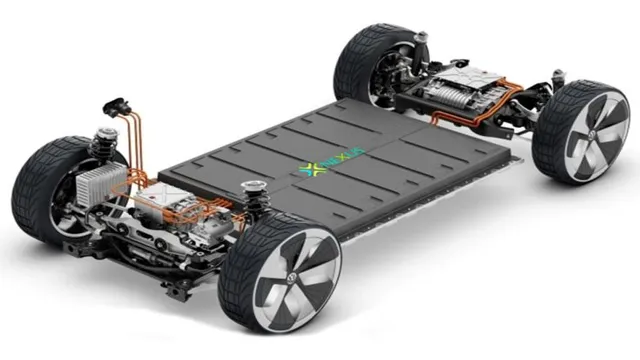
Why Lithium-ion Batteries are Commonly Used in Electric Cars
Yes, most electric cars use lithium-ion batteries, and for good reason. Lithium-ion batteries offer several advantages over other types of batteries, such as lead-acid and nickel-metal hydride batteries. For one, they have a higher energy density, meaning they can store more energy in a smaller and lighter battery pack.
This translates into longer driving ranges and shorter charge times for electric cars. Additionally, lithium-ion batteries have a longer lifespan, meaning they can last for several years before needing to be replaced. They also require less maintenance and are less prone to failure than other batteries.
While some electric cars use other types of batteries, such as solid-state or flow batteries, lithium-ion batteries are currently the most popular and commonly used because of their reliability and efficiency.
Efficiency of Electric Cars with Lithium-ion Batteries
Lithium-ion batteries are becoming a popular choice for electric cars due to their high efficiency and energy density. These batteries are known for their ability to store large amounts of energy in a small and lightweight package, which is crucial for electric vehicles. In addition, they have a long lifespan and can be recharged multiple times.
This makes lithium-ion batteries a cost-effective and practical choice for electric cars. Compared to traditional gas-powered vehicles, electric cars with lithium-ion batteries offer a more sustainable and environmentally friendly solution. The main advantage of lithium-ion batteries is that they are much more efficient at converting stored energy into power for the car’s motor.
This means that they can travel further on a single charge, making them ideal for longer trips. Furthermore, they have faster charging times and require less maintenance than other types of batteries. Overall, lithium-ion batteries are an excellent choice for electric vehicles, offering high efficiency, low maintenance costs, and an eco-friendly solution.
Cost-effectiveness of Lithium-ion Batteries for Electric Cars
Lithium-ion batteries are currently the most commonly used type of battery in electric cars due to their cost-effectiveness. While they are slightly more expensive than other types of batteries, such as lead-acid or nickel-metal hydride, they are far superior in terms of overall performance and efficiency. Lithium-ion batteries are lightweight, which helps to extend the range of electric cars, and they also have a long lifespan, which means they can be used for many years before needing to be replaced.
In addition to this, lithium-ion batteries require very little maintenance, making them a great choice for drivers who are looking for a more low maintenance option. Ultimately, the cost-effectiveness of lithium-ion batteries is what makes them the ideal choice for electric car manufacturers who are trying to create affordable and practical electric vehicles for the mass market.
Are All Electric Cars Equipped with Lithium-ion Batteries?
If you are looking to purchase an electric car, you may be wondering if all of them are equipped with lithium-ion batteries. The short answer is no, not all electric cars use lithium-ion batteries. While many electric vehicles use this type of battery, there are other types of batteries that are also used.
For example, some electric cars use nickel-metal hydride batteries or even solid-state batteries. That being said, lithium-ion batteries are by far the most common type used in electric cars due to their high energy density and relatively low cost. In addition, these batteries have a longer lifespan and can be charged quickly compared to other types of batteries.
So, while not all electric cars use lithium-ion batteries, they are still the most popular and practical choice for electric vehicles.
Overview of Other Types of Batteries Used in Electric Cars
While lithium-ion batteries are the most common type of battery used in electric cars, not all electric vehicles are equipped with this type of battery. Other types of batteries that have been used in electric cars include nickel-metal hydride (NiMH) and lead-acid batteries. NiMH batteries offer a higher energy density than lead-acid batteries and are more environmentally friendly, but they can be more expensive.
Lead-acid batteries are heavy and have a limited lifespan, but they are still used in some electric cars due to their low cost. Engineering advances have allowed lithium-ion batteries to become the most popular choice because they can store more energy, can be charged more quickly, and are more reliable. Additionally, they are safer due to their solid-state electrolyte, compared to their liquid counterparts.
So, while there are other options, lithium-ion batteries currently offer the best combination of performance, cost, and safety, which is why they are the most widely used type of battery in electric cars today.
Percentage of Electric Cars with Lithium-ion Batteries
Electric cars are becoming more popular every year, and many of these vehicles are equipped with Lithium-ion batteries. However, not all electric cars are made equal. In fact, the percentage of electric cars with Lithium-ion batteries varies greatly depending on the make and model.
While some electric vehicles, such as the Tesla Model S, are exclusively fitted with Lithium-ion batteries, others may use different battery chemistries. For example, the Nissan Leaf, one of the most popular electric cars, uses a Lithium-ion battery pack, while the BMW i3 and Chevrolet Volt use a combination of Lithium-ion and other battery types. Ultimately, the choice of battery chemistry depends on a multitude of factors, including cost, performance, and safety.
While Lithium-ion batteries are currently the most popular choice due to their high energy density and long life span, other battery chemistries, such as solid-state batteries, may become more common in the future as technology advances.
Advantages of Lithium-ion Batteries in Electric Cars
While not all electric cars contain lithium-ion batteries, these types of batteries offer several advantages for electric vehicles. One of the main benefits is their high energy density, meaning they can store a large amount of energy in a relatively small space. This makes them ideal for electric cars, as they allow for a longer driving range with fewer batteries.
Additionally, lithium-ion batteries are also lightweight, which helps to improve the overall efficiency and performance of electric vehicles. They are also known for their ability to recharge quickly, which is a significant advantage for EV owners who need to replenish their batteries on-the-go. Overall, while not all electric cars contain lithium-ion batteries, their numerous advantages make them an increasingly popular choice for electric vehicle manufacturers and consumers alike.
Fast Charging Time
One of the major advantages of lithium-ion batteries in electric cars is their fast charging time. With traditional lead-acid batteries, it can take hours to recharge a car’s battery fully. Lithium-ion batteries, on the other hand, can be charged in a fraction of the time.
This means that electric car owners can spend less time waiting for their cars to charge and more time on the road. Additionally, fast charging times make it more convenient to use electric cars for longer trips, as drivers can easily stop and recharge their vehicles along the way. This makes electric cars much more practical and convenient for everyday use.
With lithium-ion batteries, the future of electric cars looks bright, and we can expect to see even more environmentally-friendly transportation options in the coming years.
Long Battery Life
Electric cars have become increasingly popular, and one of the reasons why is their long battery life. Lithium-ion batteries are the most commonly used type in these vehicles, and they offer several advantages over traditional lead-acid batteries. Firstly, they are much lighter and more compact, allowing for more efficient use of space in the car.
Secondly, they have a much higher energy density, meaning they can store more energy in a smaller space. This translates into a longer range for the car, making it more convenient for drivers who don’t want to worry about constantly recharging their battery. Additionally, lithium-ion batteries have a longer lifespan than lead-acid batteries, meaning they can last for years without needing to be replaced.
Finally, they are much more environmentally friendly, as they don’t contain heavy metals or toxic chemicals that can harm the environment. Overall, lithium-ion batteries are the way forward for electric cars, providing a clean, efficient, and long-lasting power source for a greener future.
Eco-Friendly Production and Recycling
One of the most significant advantages of lithium-ion batteries in electric cars is their eco-friendliness. Lithium-ion batteries are highly recyclable, making them an excellent choice for environmentally conscious drivers. Unlike traditional lead-acid batteries that are disposed of in landfills, lithium-ion batteries can be refurbished and used in other applications after their initial use in electric cars is complete.
This means that fewer batteries end up in landfills, reducing the amount of toxic waste and CO2 emissions. Additionally, lithium-ion batteries are rechargeable, meaning that they can be used for several years before needing replacement. Since fewer batteries need to be produced, the amount of natural resources utilized for battery production is significantly reduced.
Overall, the eco-friendliness of lithium-ion batteries makes them a top choice for drivers looking to reduce their carbon footprint and make a positive impact on the environment.
Conclusion
In conclusion, the question of whether all electric cars contain lithium-ion batteries can be answered with a resounding ‘yes’. Just like how every superhero needs a trusty sidekick, every electric car needs a reliable battery to power its adventures on the roads. And when it comes to electric car batteries, the lithium-ion battery is definitely the Robin to every electric car’s Batman – the unsung hero that keeps everything running smoothly while driving us towards a cleaner, more sustainable future.
“
FAQs
What type of batteries are commonly used in electric cars?
Lithium ion batteries are typically the most common type of battery used in electric cars.
Is it true that all electric cars use lithium ion batteries?
Yes, the majority of electric cars use lithium ion batteries as their primary power source.
Are there any other alternative types of batteries used in electric cars besides lithium ion?
Yes, there are some electric cars that use other types of batteries such as nickel-metal hydride or lead-acid batteries.
What are some advantages of using lithium ion batteries in electric cars?
Lithium ion batteries are lighter, more efficient, and have a longer lifespan compared to other types of batteries, making them a popular choice for electric car manufacturers.
Are there any drawbacks to using lithium ion batteries in electric cars?
One potential drawback is the cost of producing and replacing lithium ion batteries, which can be more expensive compared to other types of batteries. Additionally, lithium ion batteries can be prone to overheating and degradation if not properly maintained.
